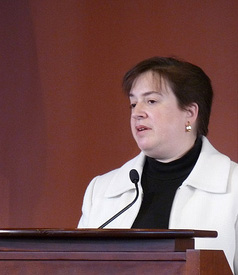
By Joshua Frank
 Alfalfa is the fourth largest crop grown in the United States and Monsanto wants to control it. On April 27, the Supreme Court heard arguments in a case that could well write the future of alfalfa production in our country.
Alfalfa is the fourth largest crop grown in the United States and Monsanto wants to control it. On April 27, the Supreme Court heard arguments in a case that could well write the future of alfalfa production in our country. Fortunately, for those who are concerned about the potential environmental and health impacts of genetically engineered (GE) crops, Supreme Court nominee Elena Kagan is not yet residing on the bench.
For the past four years, the Center for Food Safety (CFS), a Washington DC-based consumer protection group, and others have litigated against Monsanto and the United States Department of Agriculture (USDA) regarding the company's Roundup Ready alfalfa. The coalition has focused their fight against Monsanto's GE alfalfa, based on concerns that the plants could negatively impact biodiversity as well as other non-GE food crops.
In 2007, a California US District Court ruled in a landmark case that the USDA had illegally approved Monsanto's GE alfalfa without carrying out a proper and full Environmental Impact Statement. The plaintiffs argued that GE alfalfa could contaminate nearby crops with its genetically manipulated pollen. Geertson Seed Farm, with the help of CFS, claimed that the farm's non-GE crops could be damaged beyond repair by Monsanto's Roundup Ready alfalfa.
Monsanto's well-paid legal team appealed the court's decision, but, in June 2009, the Ninth Circuit Court of Appeals upheld the previous ruling and placed a nationwide ban on Monsanto's Roundup Ready alfalfa.
"USDA should start over and truly evaluate the contamination of non-GM alfalfa and the potential affects on seed growers, organic and natural meat producers, dairy producers, and conventional and organic honey producers," said farmer and anti-GE advocate Todd Leake shortly after the ruling.
Monsanto, however, didn't back down and appealed the Ninth Circuit's decision to the US Supreme Court. In stepped Elena Kagan, whose role as solicitor general is to look out for the welfare of American citizens in all matters that come before the high court.
Unfortunately, Kagan opted to ditch her duty and instead side with Monsanto. In March 2010, a month before the Supreme Court heard arguments in the case, the solicitor general's office released a legal brief despite the fact that the US government was not a defendant in the case.
As Kagan's office argued, "The judgment of the court of appeals should be reversed, and the case should be remanded with instructions to vacate the permanent injunction entered by the district court."
Despite numerous examples of cross-pollination of GE crops, Monsanto argued during the April 27 court proceedings that this was highly unlikely to occur. CFS and other plaintiffs are concerned that a federal law could be affected by the Supreme Court's ruling. Courts in Oregon and California have already argued in previous cases that GE seeds must also be studied as to the potential impact on other conventional and organic crops.
Surprisingly, it seems that Kagan does not support a thorough study of GE seeds and their potential impact on environmental and human health. In doing so, Kagan has sided with conservative justices on the court who appeared skeptical that the lower courts had made the right decision in banning GE alfalfa.
"USDA should start over and truly evaluate the contamination of non-GM alfalfa and the potential affects on seed growers, organic and natural meat producers, dairy producers, and conventional and organic honey producers," said farmer and anti-GE advocate Todd Leake shortly after the ruling.
Monsanto, however, didn't back down and appealed the Ninth Circuit's decision to the US Supreme Court. In stepped Elena Kagan, whose role as solicitor general is to look out for the welfare of American citizens in all matters that come before the high court.
Unfortunately, Kagan opted to ditch her duty and instead side with Monsanto. In March 2010, a month before the Supreme Court heard arguments in the case, the solicitor general's office released a legal brief despite the fact that the US government was not a defendant in the case.
As Kagan's office argued, "The judgment of the court of appeals should be reversed, and the case should be remanded with instructions to vacate the permanent injunction entered by the district court."
Despite numerous examples of cross-pollination of GE crops, Monsanto argued during the April 27 court proceedings that this was highly unlikely to occur. CFS and other plaintiffs are concerned that a federal law could be affected by the Supreme Court's ruling. Courts in Oregon and California have already argued in previous cases that GE seeds must also be studied as to the potential impact on other conventional and organic crops.
Surprisingly, it seems that Kagan does not support a thorough study of GE seeds and their potential impact on environmental and human health. In doing so, Kagan has sided with conservative justices on the court who appeared skeptical that the lower courts had made the right decision in banning GE alfalfa.




No comments:
Post a Comment